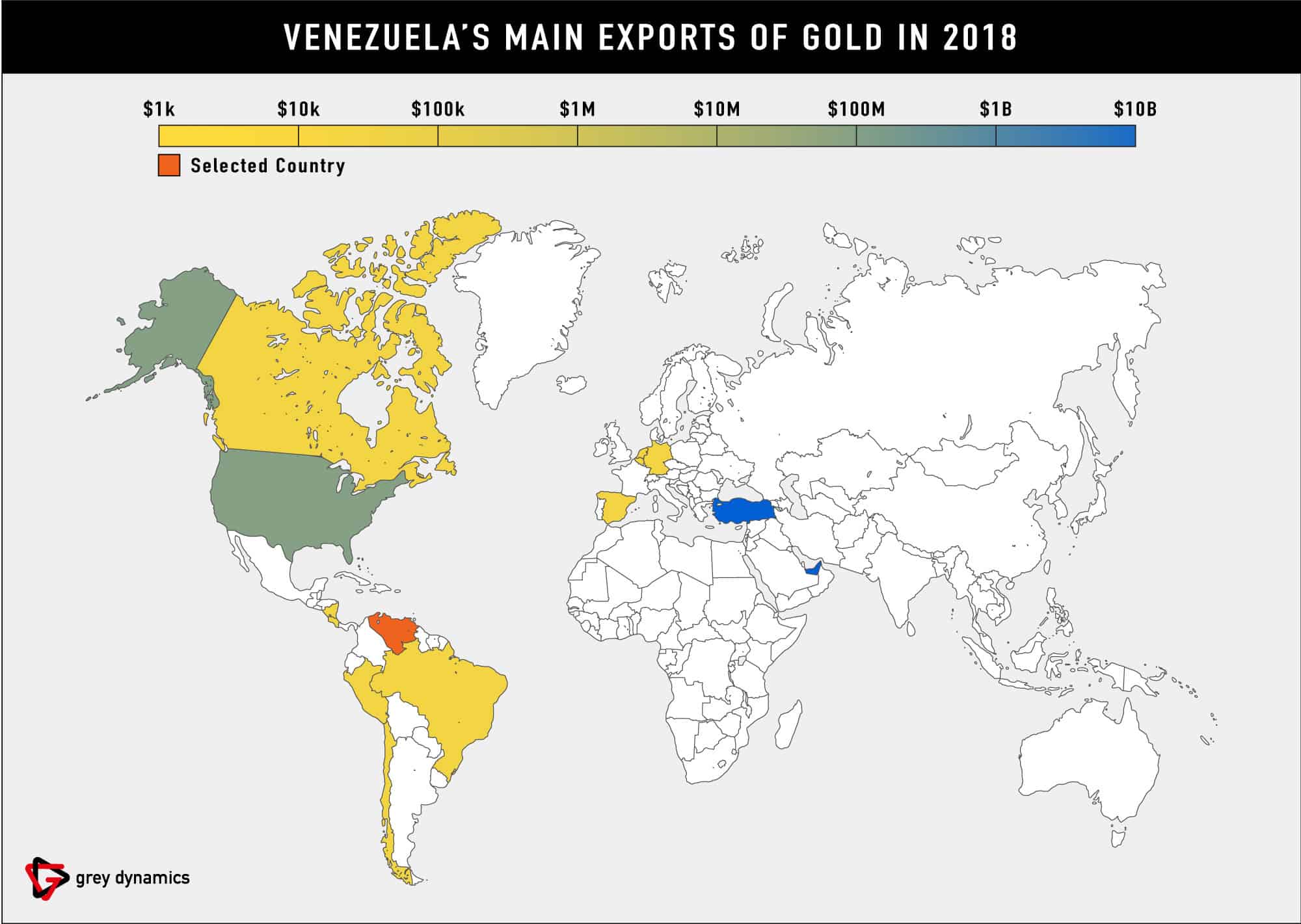
Turkey’s recent enthusiasm for Maduro is based on its interests which are not as geopolitical in comparison with those of Russia and China. Both countries sought to assert economic and political influence in the Americas. Economic and political ties between Ankara and Caracas have grown strong, especially since the 2016 coup attempt. An alliance of convenience bound by bilateral trade, mutual dislike of the United States and their personal relation of which the Venezuela’s gold trade is at the centre of it.
Political Relations
As a result of the 2017 Joint Cooperation Commission, bilateral trade volume tripled in 2018. The Independent Industrialists and Businessmen Association (MUSIAD) saw trifold growth in Turkey’s exports to Venezuela, with a rise from $37.4m in 2017 to $120.8m in 2018. The direct link to this activity is related to the US sanctions imposed on Venezuela, which Turkey criticised and declared that all trading is under international law.
Both leaders share an authoritarian style of governance and do not care about their poor human rights record and the deterioration of democratic institutions in their countries. Erdogan and Maduro feel threatened by the West and have both accused the United States of waging an economic war, accusing it to use the dollar as a tool to attack other countries. Because of that, Turkey and Venezuela intended on using the ‘petro’, a cryptocurrency in their bilateral trade.
Nicolas Maduro speaks next to a stack of gold ingots during a news conference on the country’s cryptocurrency, known as the Petro, in Caracas, Venezuela on March 22, 2018. Its trade volume with Venezuela still accounts for a fraction of Turkey’s total trade, at the level of small percentages, meaning it could cut off ties with no significant impact on Turkey’s trade.
Economic Relations
Venezuela sought new partners to raise its deteriorating economy after exports of oil slumped. US sanctions seem to not bother Turkey as it worries Western countries based in Venezuela. Turkey allegedly aided Iran to evade US sanctions by providing billions of dollars’ worth of gold in exchange for Iranian natural gas and oil. Halkbank, a state-owned Turkish bank, is accused by US prosecutors of helping Iran evade US sanctions. It would not be a surprise if it accomplishes this again with Venezuela. Grupo Iveex Insaat, registered in Turkey, bought Venezuelan oil in 2019 despite US sanctions.
With Venezuela’s economy declining, Maduro turned to gold to balance the country’s depleted foreign currency reserves. Venezuela’s Central Bank (VCB) said it moved its gold-refining operation from Switzerland to Turkey. The gold exported to Turkey would return to become part of VCB’s portfolio of assets, although there are no official records showing any gold exported back to Venezuela.
Venezuela’s Gold Trade
Rather, the refined gold is sold in Turkey or in other markets in Iran, the United Arab Emirates and Russia. The money is directly transferred to the VCB’s account held in Turkey. 73.2 tons of gold were sold between Emirati company Noor Capital, Sardes Kiymetli Madenler A.S. and a Belgian firm based in the UAE, Goetz Gold LLC. The latter is investigated by anti-corruption agencies for trading ‘blood gold’. It is defined as metals extraction in areas of conflict, financing crime and wars and violating human rights. An example of this is the Orinoco Mine Arc, currently under military organisations control and declared as a Special Economic Zone under economic emergency, which rules out any legislature and leaves a door open for illegal activities.

Sardes Kiymetli Madenler imported around $900 million worth of gold from Venezuela into Turkey in 2018. The Istanbul-based company, Mulberry Proje Yatirim, purchased the goods from Turkey on behalf of Venezuelan clients and sold them back to Venezuela. Minerven, the Venezuelan state-run mining company, partnered with Marilyns Proje Yatirim to sell gold to Turkey. In 2019, Tareck El Aissami visited Ankara to finalise the gold-refining deal, which never happened due to intensified US sanctions. Tareck is also suspected of working with Colombian and Mexican drug cartels, as part of an international money laundering scheme that helped fund Hezbollah.
Official numbers indicate that trade volume between Turkey and Venezuela dropped during the first half of 2019 to $42.6 million compared to $844.36 million in 2018. The difference between Turkish exports to imports indicates that the gold trade between the two countries was suspended in November 2018. This happens to be the same time US sanctions were announced against Venezuela’s gold trade. Venezuela likely attempted to hide the real figures to contain its relationship with Turkey. Despite the pandemic, the volume between Turkey and Venezuela tripled in the first six months of this year, compared to the same period in 2019.
In return for the gold Turkey is receiving, it became a key supplier for the Local Supply and Production Committees, known as CLAP. It is said is supplying 69% of CLAP provisions in Venezuela, around 10,000 tons a month. Adding to this, the Trade Development Agreement sells heavily discounted Turkish food products in the so called ‘gold for food’, for Maduro to stay financially afloat, creating a barter system. This food-aid program was also targeted by US sanctions due to corruption as the Financial Crime Enforcement Network states.
Summary
Turkey’s place in Venezuela is bound to US sanctions and the dollar threat. However, Maduro found an ally in Erdogan to keep Venezuela’s economy afloat, whilst Turkey benefits from the gold trade, making it rise as a 21st century global power inciting criminal activity throughout, at the expense of Venezuela. The gold for food trade benefits Turkey as it opens its doors to South America whilst it gives little aid to Venezuela’s financial and humanitarian crisis.
Image: Hurriyet Daily News (link)
